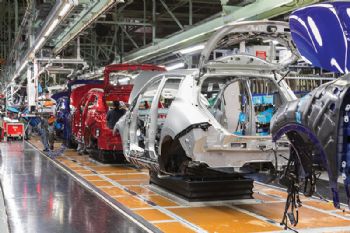
According to figures released by the Society of Motor Manufacturers and Traders (SMMT) (
www.smmt.co.uk), UK car production declined in March by 13.3% (compared with March 2017), with 147,471 cars built in British factories.
Output for the domestic market fell by 17.7% (compared with March 2017), while output for exports fell by 11.9%.
Overall output in the first quarter of 2018 fell by 6.3% compared with Q1 2017, with 440,426 cars leaving production lines (almost 80% of these were exported); and while demand from overseas customers fell by 4.0% in Q1, this was dwarfed by the 14.1% decline in manufacturing for the UK market.
The SMMT says Britain’s vehicle and component manufacturers are responsible for 13.0% of all the country’s exports in goods, adding that for every pound generated by the industry, three pounds are delivered to the economy via adjacent sectors such as logistics, retail and finance.
The SMMT calculates that the total economic impact of the automotive sector is £219 billion — some 10% of UK GDP.
SMMT chief executive Mike Hawes said: “A double-digit decline in car manufacturing for both home and overseas markets is of considerable concern.
"Following recent announcements on job cutbacks in the sector, it’s vitally important that the industry and consumers receive greater certainty, both about future policies towards diesel and other low-emission technologies, and our post-Brexit trading relationships and customs arrangements.
"Maintaining free and frictionless trade is an absolute priority; it has been fundamental to our past success and
is key to our future growth.”
Meanwhile, UK commercial-vehicle (CV) production declined for the seventh consecutive month in March, with 7,145 vans, trucks, buses and coaches leaving production lines — a fall of 10.8% compared with March last year.
Overseas demand remained relatively stable, but this was not enough to offset the decline in CVs built for the UK market, which fell by 24.9%.
Exported CVs accounted for 66.8% of production in March. In the first quarter, 19,252 CVs were built in the UK, down 17.9% on the same period last year, with the domestic and overseas markets falling by 26.6% and 13.0% respectively.
The picture regarding engines was not quite as dismal, with production falling by just 3.7% in March, as demand from UK plants fell for a second month.
Exports provided a counter to the challenging domestic market; they were up 4.8% compared with March 2017 and up 12.1% compared with the first quarter of last year.
Overall, the first quarter was up 5% on 2017 levels, with 780,000 engines produced.